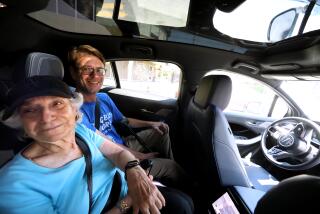New Rule Runs Pedicabs Off the Streets
- Share via
SANTA BARBARA — Every Christmas season needs a Scrooge.
This year, people here are nominating the leadership of this sunny postcard municipality for the role. Their offense? Shutting down the fleet of bicycle taxis that added color and energy to the town’s night life.
The pedicabs, as they are called, had for five years ferried tourists around town and made sure that drunks spilling out of the bars on downtown’s State Street got home safely.
“They’d tell us, ‘I don’t have any money, can you get me somewhere safe?’ ” said Seth Tuton, 28. “We’d give them free rides.”
Tuton may be biased in favor of the oddball vehicles, which, gilded with fake flowers and palm fronds, resembled small Mardi Gras floats. He operated one of the two pedicab businesses, North American Rickshaw Co. But other State Street denizens lamented the demise of the cabs, which ran afoul of new city rules requiring insurance and a business license.
“People loved the pedicabs,” said Katie Watrous, 20-year-old assistant manager of the Hot Spots coffee shop, where many of the riders relaxed after work. “They were good guys. It shouldn’t have happened, at least right before Christmas.”
Even Mayor Marty Blum professed fondness for the pedicab fleet, which on busy nights ranged up to 20 pedal-driven vehicles, and the distinctly unbusinesslike businessmen who operated them. Her husband plays beach volleyball with Tuton, a long-faced young man with dark, curly hair who prefers sandals and a Hawaiian shirt to a suit and tie. He drives, and lives in, a 1971 Volkswagen van decorated with images of cresting waves.
“We love our pedicabs,” Blum said.
The problem was they weren’t licensed with the city, nor were they insured against accidents. Not long ago, the brakes failed on one and it ran into a stopped car, jarring two pregnant women who had to be checked out at the hospital. (Both were fine.)
Then there was the problem of public safety, said Lt. Mike Aspland of the Santa Barbara Police Department. He said one driver was arrested for allegedly prowling outside the home of two women whom he had just given a ride. The district attorney declined to file the case.
Based on these and other incidents, the City Council passed a set of regulations that took effect this month requiring the pedicab operators to pay a $55 city license fee and obtain insurance.
“We are requiring them to go through the same process as everybody else” operating a business, Aspland said.
To him, it’s no big deal. To Tuton, it’s a very big problem. He said insurance would cost him $1,200 for each cab, a figure Aspland disputes.
“I don’t have that kind of money,” Tuton said. Particularly because he made a practice of not charging for the rides. People who wanted to give tips did so. Once he got $100 for taking actor Richard Gere and a date just down the road to Montecito. But that was a rarity.
There was a good reason to work only for tips. The old city rules exempted from business license requirements those businesses that didn’t charge for their services. But Tuton said he wouldn’t charge customers even if he could. The pedicab business changed his life.
Tuton was in the Navy before hitching his bicycle to a dream.
He was accustomed to the hardness of military life and military thinking.
“Being in the Navy, people yelled at me all the time,” he said. “I came out here and people loved me.”
He started with “zero money and one pedicab.” He now has 15 stored away at a cost of $300 a month while he beds down in the back of his van. What Tuton misses most is the people: the locals who had drunk their wallets dry but thanked him for getting them home safely, the foreign visitors who took pictures of him.
He even met his girlfriend while sitting on his bike. She walked up and gave him a rose.
“I understand they’re concerned about safety,” he said of the city. “But we really haven’t had any problems. Why doesn’t the city try to help someone who is trying to do good?”
Aspland isn’t buying the poor mouth routine. He believes the operators can afford the fees and insurance.
“They average $200 to $300 a night,” he said, a figure Tuton disputes.
The city modeled its ordinance on pedicab regulations already in use in San Diego and San Francisco, Aspland said. The companies in those cities seem to be doing OK.
That hasn’t silenced the critics. A national TV film crew came through a while back and stopped to see Mayor Blum. The interviewer, she recalled, asked her if she was running a totalitarian state.
She joshed back that she wouldn’t run for mayor in a totalitarian state. Then the reporter called the council members busybodies.
“Maybe I am a busybody,” Blum said.
But there may yet be a solution to the pedicab pedagogy. Tuton and the other operator, who has since left town, stopped in to see the mayor recently.
Both sides came away feeling some progress was made. In the meantime, it looks like the State Street drunks are going to have to fend for themselves this New Year’s Eve.
More to Read
Sign up for Essential California
The most important California stories and recommendations in your inbox every morning.
You may occasionally receive promotional content from the Los Angeles Times.













